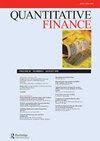基于多步凸优化方法的高维稀疏索引跟踪
IF 1.4
4区 经济学
Q3 BUSINESS, FINANCE
引用次数: 0
摘要
为了解决稀疏索引跟踪问题,凸惩罚和非凸惩罚都被广泛提出。基于最小绝对收缩和选择算子(LASSO)及其变化的惩罚由于其良好的稀疏解生成特性,在凸惩罚流中经常被提出。然而,lasso类型的惩罚通常表现出较差的样本外性能,因为通过将参数估计缩小到零,在跟踪投资组合权重的估计中引入了相对较大的偏差。另一方面,非凸惩罚可以用来改善lasso型惩罚的偏差问题。然而,由此产生的问题是非凸优化,因此计算量很大,特别是在高维设置中。为了在保证计算效率的同时改善LASSO型惩罚带来的偏差,提出了一种基于多步加权LASSO (mws -LASSO)的多步凸优化方法用于稀疏索引跟踪。实证结果表明,该方法比基于lasso型惩罚的跟踪误差更小,性能优于基于非凸惩罚的跟踪误差。本文章由计算机程序翻译,如有差异,请以英文原文为准。
High-dimensional sparse index tracking based on a multi-step convex optimization approach
Both convex and non-convex penalties have been widely proposed to tackle the sparse index tracking problem. Owing to their good property of generating sparse solutions, penalties based on the least absolute shrinkage and selection operator (LASSO) and its variations are often suggested in the stream of convex penalties. However, the LASSO-type penalty is often shown to have poor out-of-sample performance, due to the relatively large biases introduced in the estimates of tracking portfolio weights by shrinking the parameter estimates toward to zero. On the other hand, non-convex penalties could be used to improve the bias issue of LASSO-type penalty. However, the resulting problem is non-convex optimization and thus is computationally intensive, especially in high-dimensional settings. Aimed at ameliorating bias introduced by LASSO-type penalty while preserving computational efficiency, this paper proposes a multi-step convex optimization approach based on the multi-step weighted LASSO (MSW-LASSO) for sparse index tracking. Empirical results show that the proposed method can achieve smaller out-of-sample tracking errors than those based on LASSO-type penalties and have performance competitive to those based on non-convex penalties.
求助全文
通过发布文献求助,成功后即可免费获取论文全文。
去求助
来源期刊

Quantitative Finance
社会科学-数学跨学科应用
CiteScore
3.20
自引率
7.70%
发文量
102
审稿时长
4-8 weeks
期刊介绍:
The frontiers of finance are shifting rapidly, driven in part by the increasing use of quantitative methods in the field. Quantitative Finance welcomes original research articles that reflect the dynamism of this area. The journal provides an interdisciplinary forum for presenting both theoretical and empirical approaches and offers rapid publication of original new work with high standards of quality. The readership is broad, embracing researchers and practitioners across a range of specialisms and within a variety of organizations. All articles should aim to be of interest to this broad readership.
 求助内容:
求助内容: 应助结果提醒方式:
应助结果提醒方式:


